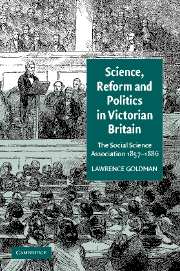Book contents
- Frontmatter
- Contents
- List of illustrations
- Acknowledgements
- Note on citations in the text
- List of abbreviations
- Introduction: the contexts of the Social Science Association
- Part I POLITICS
- Part II REFORM
- Chapter 4 Liberalism divided and feminism divided: women and the Social Science Association
- Chapter 5 Transportation, reformation, and convict discipline: the Social Science Association and Victorian penal policy 1853–1871
- Chapter 6 Victorian socio-medical liberalism: the Social Science Association and state medicine
- Chapter 7 Labour and capital: the Social Science Association, trade unionism, and industrial harmony
- Chapter 8 The Social Science Association and middle-class education: secondary schooling, endowments, and professionalisation in mid-Victorian Britain
- Chapter 9 The Social Science Association and the making of social policy
- Part III SCIENCE
- Part IV DECLINE
- Conclusion: The Social Science Association and social knowledge
- Appendix I The founders of the Social Science Association, 29 July 1857
- Appendix II Social Science Association Congresses, 1857–1884
- Appendix III Presidents of the Social Science Congresses, 1857–1884
- Appendix IV Departmental presidents, 1857–1884
- Select bibliography
- Index
Chapter 9 - The Social Science Association and the making of social policy
Published online by Cambridge University Press: 22 September 2009
- Frontmatter
- Contents
- List of illustrations
- Acknowledgements
- Note on citations in the text
- List of abbreviations
- Introduction: the contexts of the Social Science Association
- Part I POLITICS
- Part II REFORM
- Chapter 4 Liberalism divided and feminism divided: women and the Social Science Association
- Chapter 5 Transportation, reformation, and convict discipline: the Social Science Association and Victorian penal policy 1853–1871
- Chapter 6 Victorian socio-medical liberalism: the Social Science Association and state medicine
- Chapter 7 Labour and capital: the Social Science Association, trade unionism, and industrial harmony
- Chapter 8 The Social Science Association and middle-class education: secondary schooling, endowments, and professionalisation in mid-Victorian Britain
- Chapter 9 The Social Science Association and the making of social policy
- Part III SCIENCE
- Part IV DECLINE
- Conclusion: The Social Science Association and social knowledge
- Appendix I The founders of the Social Science Association, 29 July 1857
- Appendix II Social Science Association Congresses, 1857–1884
- Appendix III Presidents of the Social Science Congresses, 1857–1884
- Appendix IV Departmental presidents, 1857–1884
- Select bibliography
- Index
Summary
THE SOCIAL SCIENCE ASSOCIATION AND THE MID-VICTORIAN STATE
In 1860 Herbert Spencer found ‘numerous developments’ in the SSA's Transactions of the ‘mischievous error’ that ‘it is the duty of the state, not simply to insure each citizen fair play in the battle of life, but to help him in fighting the battle of life’. After listening to the addresses at the 1860 Glasgow congress, The Times believed that ‘Social Science meetings’ were creating ‘an incipient school for legislative interference in morals’. A decade later Josephine Butler criticised the Association for ‘stimulating legislation in matters which had much better not be legislated about, but … left to the common sense of the English people’. Alongside her agitation for the repeal of the Contagious Diseases Acts, she was also the first secretary of the anti-statist Vigilance Association for the Defence of Personal Rights. Spencer and Butler were absolutely parti pris, of course: Spencer was the acknowledged scourge of ‘over-legislation’ and Butler blamed the SSA among others for the Contagious Diseases Acts. Were they correct? Did the SSA stimulate social interventions by the state?
Historical discussion on the place of the state in Victorian Britain has suffered from confusion over the definition of terms: there has been little agreement over the meaning of concepts such as ‘laissez-faire’ and ‘individualism’, for example. Victorians were equally confused. As Mill explained in On Liberty, 'there is, in fact, no recognised principle by which the propriety or impropriety of government interference is customarily tested.
- Type
- Chapter
- Information
- Science, Reform, and Politics in Victorian BritainThe Social Science Association 1857–1886, pp. 262 - 290Publisher: Cambridge University PressPrint publication year: 2002



